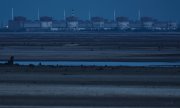Zaporizhzhia power plant: at risk of being blown up?
The Security Service of Ukraine (SBU) has warned of the danger of a Russian attack on the Zaporizhzhia Nuclear Power Station and says that Russian forces have mined the plant's cooling pond. President Zelensky said on Tuesday that objects resembling explosives had been placed on the roofs. Meanwhile Moscow claims that Ukraine is planning an attack on the plant. Commentators are divided on how dangerous the situation really is.
Fears are justified
An attack cannot be ruled out, Corriere della Sera fears:
“The new Russian strategy is no longer focused on conquering new territories, but on defending the areas occupied in the south-east of the country using bunkers and minefields. And it's precisely this strategy of defence at any cost that worries the Ukrainians. According to Zelensky and his closest collaborators, if Putin did not shrink from causing a humanitarian and environmental tragedy by destroying the Kakhovka Damthen there is good reason to believe he would even be ready to cause a nuclear incident in order to block or at least slow down the Ukrainian advance.”
Attacks on Russian territory then possible
If there were an attack on the nuclear power plant it would remove the last reservations about supplying offensive weapons, political scientist Volodymyr Fessenko speculates in NV:
“Any incident at the Zaporizhzhia nuclear power plant with - God forbid - serious consequences, would elicit a very harsh reaction from the West and there would be no more talk of an agreement with Putin. ... Moreover, it would mean that we would obtain the weapons that would enable us to attack Russian territory. That means that the reaction could be as follows: no direct Nato participation in the war against Russia, but the provision of weapons that enable us to attack Russian territory.”
Manipulation could also be at play here
Perhaps it is no mere coincidence that fears about the fate of the power plant are being fuelled now, La Croix speculates:
“The uncertainty continues to cause concern in neighbouring countries that could potentially be affected by a radioactive cloud. But some of these countries - Poland and the Baltic states - are among Kyiv's staunchest allies. At next week's Nato summit, they will push for the North Atlantic Alliance to open its doors to Ukraine. Incidentally, this important meeting could explain the state of alarm regarding the nuclear power plant. The context lends itself to manipulation operations. For the war is also taking place in the area of disinformation.”
More of a threat than a realistic scenario
Jutarnji list does not believe Russia would intentionally cause a nuclear incident:
“The [US think tank] Institute for the Study of War (ISW) believes that it is unlikely that Russia would trigger a radiological incident at the Zaporizhzhia nuclear power plant because it would not be possible for it to control the effects of the accident. This would jeopardise Russia's ability to control the occupied territories in southern Ukraine. The ISW estimates that the consequences of such an act would outweigh any benefits to Russian forces. ... Russia, however, will likely continue to use the threat of a nuclear incident in order to curb the Ukrainian counteroffensive and reduce Western military assistance.”
Stand up to nuclear provocation
Mikhailo Podolyak, Advisor to the Head of the Office of the President of Ukraine, calls on Twitter and Gordonua.com for the international community to take a firm stance against any actions by Russian forces at and in the nuclear power plant:
“A single public declaration by the world leaders could preserve us from a terrorist attack on Europe's largest nuclear power plant: 'Any provocation by Russia at the Zaporizhzhia nuclear power plant will immediately draw an equal response with the use of tactical nuclear weapons, with the corresponding concrete consequences'. But what do we hear instead? An absolute and very telling silence. ... Isn't it time to stop making the same mistake over and over again?”
No risk of another Fukushima
If there was a nuclear accident at the Zaporizhzhia power plant, at least the surrounding area would not become uninhabitable, explains Mikola Gavris, a lecturer at the Kharkiv Polytechnic Institute, in Dzerkalo Tyzhnya:
“The biggest risk is that the Russians are unlikely to leave the nuclear power plant peacefully if the time comes for them to flee. They would probably try to blow up either the dry storage or the spent fuel pools. In the first scenario the surrounding area would be contaminated, but most of the radioactive material would remain in the storage facility. In the second scenario the interior of the Zaporizhzhia plant would be heavily contaminated. Outside the facilities, however, there would be virtually no radioactive contamination. A large-scale evacuation or even an exclusion zone would not be necessary.”
IAEA playing down threat posed by mines
Olga Kozharna, a former member of the board of the State Nuclear Regulatory Inspectorate of Ukraine, criticises the fact that the IAEA report on the mines around the nuclear power plant says they don't affect its main safety functions. In NV she accuses IAEA chief Rafael Grossi of being biased in Russia's favour:
“Such statements clearly show that Grossi tolerates having nuclear terrorists from Russia at the Zaporizhzhia NPP. The photo showing him in the arms of Renat Karchaa (in Russian state media Karchaa is described as a 'nuclear expert' and advisor to Rosatom chief - NV), and his warm words to him at the end of the mission, as well as his statements during the briefing at the nuclear power plant, are documentary evidence that the head of the international organisation is acting in the interests of the occupiers.”

